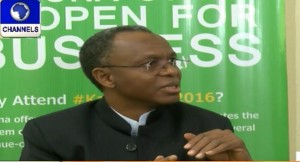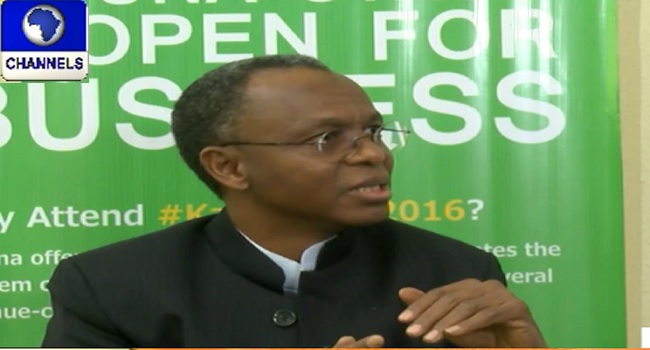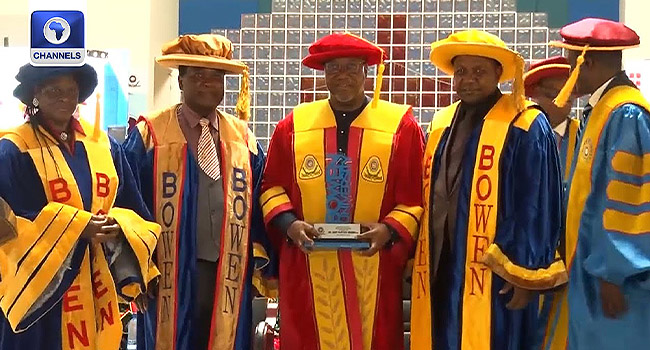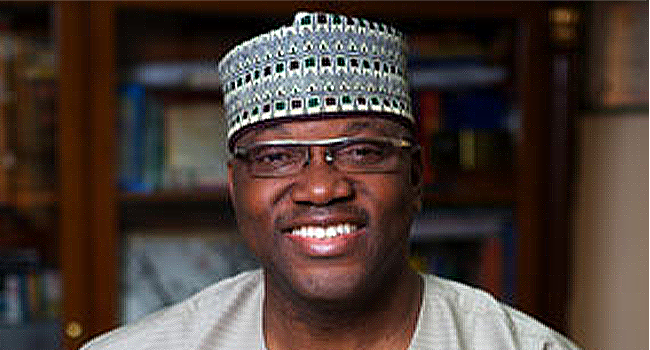
Speaking on Sunrise Daily, the former minister said “killings in Southern Kaduna have more or less stopped”, adding that “there has been no killing in the last six months”.
He said his first mission after assuming office was to call a security meeting to address the killings and reprisal killing that occurred after the general elections.
“In the south you have Christians and non-indigenes and in the north you have mostly Muslims and Hausa speaking northerners and it is very unhealthy”, maintaining that “these repeated cycles of ethnic and religious violence are part of what contributed to what is destroying Kaduna”.
He further noted that many lives were lost during the post-election violence resulting in displaced Fulanis turning to castle rustling and a series of reprisal killings in Southern Kaduna.
The Governor attributed the success to the “intervention of a committee we set up under the leadership of Gen. (Martin Luther) Agwai (Rtd), who did a very good job by going round and tracing the root of these killings and found that most of those who come in to do those killings are from other countries like Cameroon, Chad, Mali and Senegal.
“This happened in April and these cattle rearers had come from these countries and were going back, because they move across the West African sub region and were going back with their cattle and this problem happened, if you remember the elections of 2011 and they were just victims that were passing through.
“And of course you know the Fulani have a long memory of revenging any killings; so there relations were coming from other countries to revenge the killings and we had to reach out to some of these countries outside Nigeria telling them this cannot continue”, he said.
He further noted that they offered to compensate those affected “and do anything” to bring the killings to an end, insisting that “there is no sense wiping out an entire village just because something happened five years ago”.
Mr El-Rufai said these tactics have brought about the needed result, maintaining that “there has been no killing in the last six months, since Agwai did that job and reached out to these people and talked to them.
On cattle rustling, Mr El Rufai said a joint military operation was funded by himself alongside governors of Zamfara, Niger, Katsina and Kebbi – states where they use as refuge – “to flush them out and so far, we have recovered cattle and many of the rustlers have been killed”.
What Is The Preaching Bill About?
The former DG of BPE cleared the air on the controversial bill aimed at checking the activities of preachers in the state, which has generated controversy among Muslims, Christians and legal practitioners.
“The reason behind it (the Bill) is simple. Here, in this state, we have lost thousands of lives, billions of property, plus total communal division because of the abuse and misuse of religion”, he noted.
He recalled one of the first clashes recorded in the state caused by a pastor, “Rev Bako”, using a Quran to preach in 1987 in Kafanchan, an action which upset Muslims, resulting in clashes that spread to Kaduna, Zaria and Funtua.
He added that “we have lost more people from the speeches of religious leaders than from anything in this state and we believe that there is a need for us to know who is preaching, so the person knows he is being watched and watches what he says.
“Religious leaders are supposed to unite”, he maintained, wondering why someone will attack another religion while preaching his own.
“This is what we wanted to regulate and this law has been in the statutes book. It was first enacted in 1984 after the Maitatsine crisis and variously amended by various governors in reaction to various crisis that have happened in this state”.
The Governor went down memory lane to list clashes caused as a result of preaching by individuals who have little or no knowledge in Islamic jurisprudence forcing the authorities to step in.
“Are we going to wait, as political leaders, until lives are lost before we do something? “, he asked.
The Governor noted that it is the present security challenges that prompted his administration to update what has been in the statutes book since 1984 to accommodate new technologies.
“What we want is that when you are preaching in your Mosque/Church, you must have gone through a process of education and training that the Christian Association of Nigeria/Jama’atu Nasir Islam is comfortable with, then we give you a license”.
“We will watch you for a year. We have security agents that attend sermons and church services that report to us if you are preaching hate, because the issue in Kaduna is the issue of hate”, he said.




